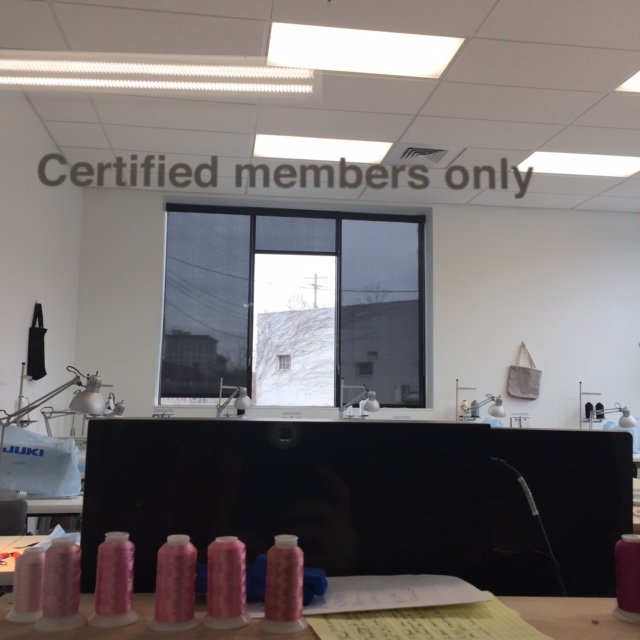Open Works: Safety as Process

Open Works: Safety as Process
Baltimore’s Open Works Maker Space Offers Innovative and Reflexive Safety Classes and Options for Creative Makers
By Cara Ober
“Our mission is to make tools, technology, and the knowledge to use them accessible and affordable. We do this through membership access to workshops; friendly, expert staff; and classes for youth, adults, and families. Come and join us – we’d love to have you,” reads the mission statement at Open Works, Baltimore’s ambitious new maker space.
Open Works is a state-of-the-art facility in the heart of one of Baltimore’s historic manufacturing districts. It was founded with funding from BARCO, a non-profit realty corporation started by the Robert W. Deutsch Foundation.
With a long-term goal of stimulating Baltimore’s local manufacturing economy, the space offers 3D printing, a sewing lab, a CNC plasma cutter, a wood shop, metal shop, laser cutting, and all sorts of classes for adults and children, experts and hobbyists. In the six months it has been in operation, Open Works has worked hard to attract a wide variety of practitioners and to promote a diverse agenda of access. For this reason, it has become essential that the safety classes and procedures are as innovative and reflexive as the space itself.
“Safety is hugely important to us,” said Laura Cohen, Education Manager at Open Works. “Not only so people understand how to use different machines and shops, how they run, but also so that everyone remains safe in the space.” Each shop at Open Works requires specific types of safety training and certification, depending on the grade of the equipment and how each particular shop functions, even the guidelines for reserving certain machines.
“As a new space, we’re still learning what policies need to be in place,” Cohen explained. “Also folks who take these certification and safety classes get to know one another and can become a resource for each other.”
Whether a maker is a beginner, expert, or somewhere in between, all participants must take part in a general shop safety class before access is granted. In addition, Open Works offers project-based classes and workshops taught by skilled makers and organizations so that makers continue to increase in understanding of the tools and available to accomplish their goals.
Safety classes at Open Works include a preliminary class, as well as advanced and media-specific classes like Safety and Certification: CNC Plasma Cutter and Wood Shop Basics, Sewing Safety and Certification, and others specific to laser cutting, the metal shop, and the CNC Embroidery Machine.
Cohen explained that Open Works employs an extensive tech support staff. “After you take your safety and certification, or sign up for a membership or a day pass, we want to make sure that there’s always someone on site who can give a refresher or assist. At any given time there is at least one person proficient in the shop to help makers. We also give one-on-one private sessions for our most intensive shops.”
For some of the machines that are less dangerous, Open Works has developed “crash courses” to expedite usage. For example, teaching makers the software and hardware when using a 3D printer, which may not be required to use the shop, but can be helpful.
“We need people to feel safe and secure before they use the machines,” said Cohen.
At Open Works, industrial grade machines are also designed with safety in mind to avoid accidents. “Our table saw has a sensor in it, so that if it senses a finger it retracts into the table,” said Cohen. “We also use a lot of signage made with our vinyl cutter around the shop.” For example, signs might tell users where fingers should stop or where they should stand.
“We’re still figuring out how people are using the space, assessing competence in using the achiness, and training our tech staff – and safety is a priority for us,” she said. “Some people don’t feel comfortable asking questions, so one thing we are doing is getting T-shirts with ‘How can I help you?’ and ‘Need a refresher? Ask so-and-so’ to make safety a priority. When people don’t feel super comfortable they are less likely to ask for help. Our goal is to make Open Works a space where everyone regardless of ability level or experience feels comfortable and confident to make things.”
Cohen explained that relationship building is at the core of Open Works’ mission, especially in connecting people to one another, to the space, and to the city. For this reason, there are always staff members present, even in evening hours including a front desk person, security guard, and several tech helpers.
From an architectural standpoint, the building boasts large open windows and each workshop allows users to see out and inside. The building is now home to a coffee shop and roastery, so it offers two different entrances: for members and for guests. During the day, visitors can come and go freely to the lobby, where the coffee shop is open and Wifi is free. In the evening, the guest entrance is locked and only members can enter. Each member has a key fob that allows them access to the building and into specific shops and this electronic record allows the staff to monitor who comes in and out of the building, who was in each shop. Open Works offers all kinds of classes in the evenings and stays open till 9 during the week and 5 on the weekends.
“We just want to make sure that the making experience is positive,” said Cohen. “We are constantly evaluating this process and in the six months we’ve been in operation, we are proud of the progress we have made.”
